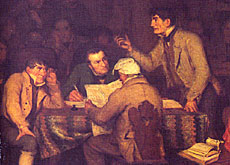
When voting was an adventure

Once upon a time, parliamentary elections in Switzerland were exciting affairs, where vote rigging, intimidation and outright violence livened up the proceedings.
Nowadays, election day is rather more sedate, with the country waiting for results already largely confirmed by exit polls.
Civilised Geneva was notorious for political violence during elections. Votes were held in a building known as the “boîte à gifles” (roughhouse) because of the fights that broke out and the unsubtle methods of persuasion used by hotheaded militants to intimidate their political opponents.
In 1848 – the year the Federal government was founded – legislatures lasted for three years, and the cantons were free to organise elections according to their own customs.
It was only in 1872 that the Confederation laid down some uniform electoral rules: a secret, written vote to be cast in the elector’s commune of residence.
Before that, electoral meetings were held in the district capital to elect candidates – proposed by the cantonal parliaments – to the House of Representatives.
Influence
Usually, voters had to meet in the main town of the constituency, but sometimes the cantons chose particular polling stations with the clear intention of influencing the result.
In 1848, the ruling Radical Party did everything it could to prevent voters in Lucerne and Fribourg from casting their ballots. The Radicals were in a minority in those largely Catholic-conservative cantons.
In Lucerne, the electoral constituencies were drawn up in a deliberately eccentric fashion, with the sole aim of making the journey to the ballot box difficult for a large number of voters.
In Fribourg, the vote was extended only to those who had sworn loyalty to the constitution, an act that irritated many voters so soon after the civil war in 1845-47 between Catholics and Protestants.
In both cantons, federal elections were held on a working day so that wage earners and farm workers could not take part.
Banned ballots
In Ticino, as in other cantons, secret ballots were banned. Voters had to meet at a certain time in the constituency’s main town.
After the reading of the decree of convocation, the names of those on the electoral roll were read out. One after the other, voters would communicate to the electoral officers, orally or in writing, the names of their preferred candidates.
A copy of the record, with the identities of the voters and the vote cast by each one, was then forwarded to the cantonal government who published the results.
Until the late 19th century, Ticino was the scene of regular electoral violence. Voters were threatened or beaten up, and ballot boxes were ransacked or destroyed. Elections were often interrupted by fights and occasionally by gunfire.
Hotly disputed
Violence generally erupted at cantonal elections, which were much more hotly disputed because there was more at stake.
Apart from choosing representatives, the cantons would decide about schools, fiscal matters and land management. Public jobs and tenders were also assigned.
Federal elections usually resulted in endless appeals over suspected irregularities or presumed fraud. Protests began with the compilation of the electoral rolls.
In Geneva voting was theoretically held in secret but the ballots were distributed by party committees, which left the door open for all sorts of pressure and manipulation.
The arrival of the secret ballot, subsequently and slowly transformed elections into a safer and fairer procedure for the private expression of political choice. But the fun was gone.
swissinfo, Marco Marcacci
In the past, federal elections were an occasion for festivities and meeting people.
Voters were more likely to fall victim to political hotheads, who had no compunction about using physical violence to intimidate their adversaries and persuade undecided voters.
Starting in 1872, the confederation issued binding regulations, including compulsory secret voting.
From a collective civic ritual, elections have slowly become an individual and private expression of the voter’s political choices.

In compliance with the JTI standards
More: SWI swissinfo.ch certified by the Journalism Trust Initiative

























You can find an overview of ongoing debates with our journalists here . Please join us!
If you want to start a conversation about a topic raised in this article or want to report factual errors, email us at english@swissinfo.ch.